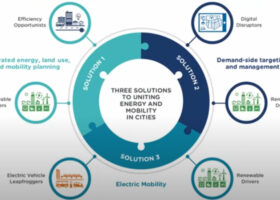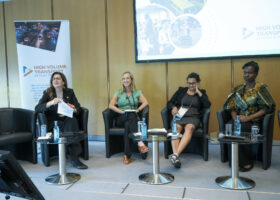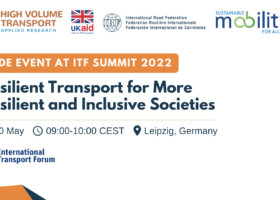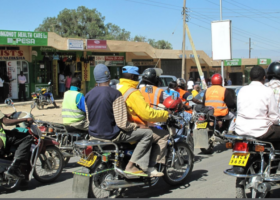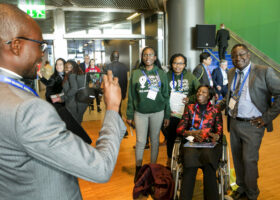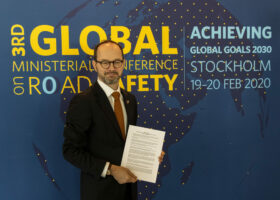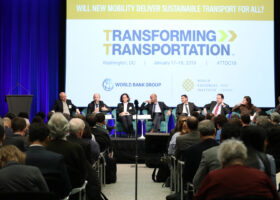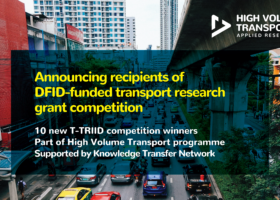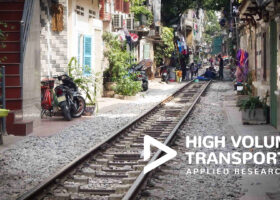Overview
The EMPOWER project aims to make a change in the existing policies, regarding sexual harassment and gender bias in the transportation sector in Sub-Saharan countries. The most important expectation from EMPOWER is for policymakers and transport providers to have access to a Decision-Making Tool that will enable them to collect the evidence needed to identify the problem, and to apply the available measures to tackle it head on. By involving stakeholders from across Africa, the tool will be tested and validated to ensure maximum transferability. It is expected that use of the Decision-Making Tool will become standard practice across Sub-Saharan Africa, strengthening the evidence base from which policies can be formed and investment unlocked.
By creating focused communication around sexual harassment on transport, the EMPOWER project will raise awareness of developments in the area of sexual harassment in transport. The identity and the key messages communicated by EMPOWER partners at the local level will reverberate to all targeted groups, i.e stakeholders, and women affected by sexual harassment. The key messages from the applied research will be communicated across the HVT Programme and beyond via a growing group of stakeholders.
Publications with the same themes
Publications with the same study countries
Related news & events
Podcast
News
News
Podcast
News
News
Podcast
News
News
News
Blog
Blog
Blog
Blog
Blog
Blog
Blog
News
Blog
Blog
News
Blog
News
Blog
Blog
Blog
Blog
Blog
Blog
News
News
News
News
News
News
PDF content (text-only)
Safer Transport for Women In SubSaharan Africa Tackling sexual harassment in public transport. The EMPOWER project aims to make a change in the existing policies, regarding sexual harassment and gender bias in the transportation sector in Sub-Saharan countries. The most important expectation from EMPOWER is for policymakers and transport providers to have access to a Decision-Making Tool that will enable them to collect the evidence needed to identify the problem, and to apply the available measures to tackle it head on. By involving stakeholders from across Africa, the tool will be tested and validated to ensure maximum transferability. It is expected that use of the Decision-Making Tool will become standard practice across Sub-Saharan Africa, strengthening the evidence base from which policies can be formed and investment unlocked. By creating focused communication around sexual harassment on transport, the EMPOWER project will raise awareness of developments in the area of sexual harassment in transport. The identity and the key messages communicated by EMPOWER partners at the local level will reverberate to all targeted groups, i.e stakeholders, and women affected by sexual harassment. The key messages from the applied research will be communicated across the HVT Programme and beyond via a growing group of stakeholders. Vectos (UK) - Laurie Pickup and Paul Curtis Median (Belgium) - Heather Allen J Turner Transport & Social Development Consultancy (UK) - Jeff Turner The Institute of Transport Economics (Norway) - Tanu Priya Uteng European Integrated Projects (Romania) - Lucia Cristea GoMetro (South Africa) - Justin Coetzee Lagos Metropolitan Area Transport Authority - LAMATA (Nigeria) - Obafemi Shitta-Bey Nana Girls and Women Empowerment Initiative (Nigeria) – Fatima Adamu University of Cape Town (South Africa) - Marianne Vanderschuren Tanya Visser (South Africa) Expected Results Consortium EMPOWER is funded by UKAid through the UK Foreign, Commonwealth & Development Office under the High Volume Transport Applied Research Programme, managed by IMC Worldwide Ltd. EMPOWER builds the capacity of transport professionals in African cities to more effectively address sexual harassment of women when they travel. This will help to facilitate gender-equitable, inclusive transport with improved participation and a diverse workforce sector. The main project deliverable is the EMPOWER Decision-Making Tool. This will be a user-friendly, internet-based resource, that will improve the ability of the policymakers and transport providers to address the issue of sexual harassment in public transport. The tool and its resources will be a valuable aid for cities across the world that face similar challenges. Provide women with safer and more secure public transport Provide policymakers and transport providers with an essential decision-making resource to improve safety and personal security within public transport by addressing sexual harassment Offer the evidence-base from which stakeholders can co-create solutions to tackle this issue Demonstrate how the sexual harassment in public transport can be addressed by multi-stakeholder collaboration Influence further research and planning practice by demonstrating the new types of data and variables that need to be collected to make gender issues more visible to decision-makers. The project is led by an international consortium, with partners from Europe and Africa. The research will be focus on four case cities: Lagos and Abuja (Nigeria), Blantyre (Malawi) and Kigali (Rwanda). It comprises an integrated data collection strategy (abiding by ethical principles) with innovative survey methods, focus groups and behaviour change workshops. The outputs of these actions will serve as inputs to the EMPOWER Decision Making Tool. EMPOWER will engage with transport professionals across Africa, as well as NGOs and International Organisations when developing the Decision-Making Tool. This collaboration will support the transferability of the tool to more audiences across the continent and the rest of the world. Vision Objectives The EMPOWER project looks to help Sub-Saharan African cities: Some of the key aspects of the EMPOWER approach include: Approach Collecting data regarding women’s travel patterns and instances of sexual harassment in public transport Investigating what needs to be done to change behaviour Developing the Decision-Making Tool and its web platform Communicating to local and international audiences about how to identify and evidence sexual harassment; and then how to address it in the context of public transport. Identifying multiple layers of key stakeholders in the case study cities Understanding local stakeholder needs and engage with them Providing training activities on how to address sexual harassment in the transport planning and management environment







